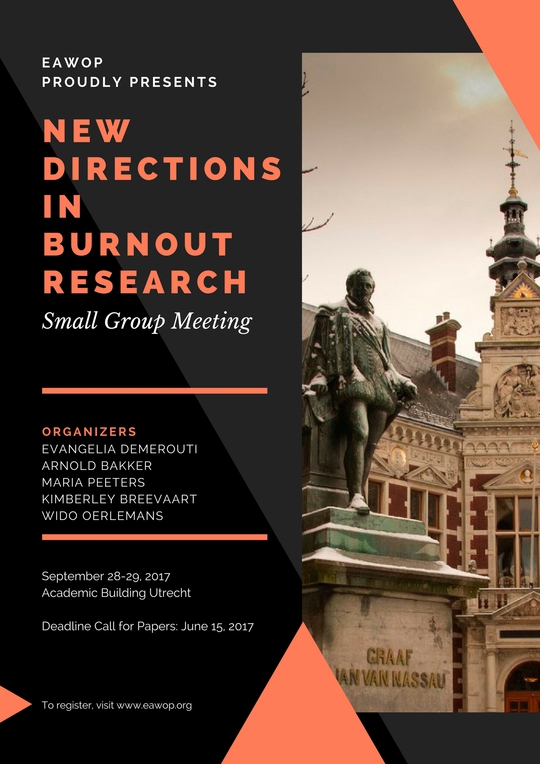EAWOP Small Group Meeting
10.05.2017

European Association of Work and Organizational Psychologists (EAWOP) Small Group Meeting
New Directions in Burnout Research - Call for Papers
28-29 September 2017
We are pleased to announce the call for papers for this European Association of Work and Organizational Psychologists sponsored Small Group Meeting.
Burnout represents a syndrome that is characterized by chronic levels of exhaustion and a cynical or distanced attitude towards work. A work context characterized by consistently high job demands and low job resources increases the risk of burnout. Research has shown that burnout is associated with unfavorable outcomes, like increased sickness absence and reduced job performance. However, some studies indicate that the link between burnout and unfavorable outcomes is not so straightforward, that we don't really know how burnout develops and evolves over time, whether it is linked to physiological indicators and if yes to which ones, and that there is little knowledge on interventions and treatment of burnout. These gaps urge the initiation of new directions in burnout research by bringing together not only academics but also consultants with experience regarding burnout therapy.
Therefore, the aims of this small group meeting are to:
-
Comprehend how employees (‘patients’) experience job burnout when they have been affected by it;
-
Elaborate, extend and posit new theoretical processes that explain how burnout is caused and how it is related to outcomes;
-
Elaborate, extend and posit new theories regarding strategies individuals use to prevent or deal with burnout;
-
Explore new methodologies capable of capturing burnout’s nuanced links with behavioral and physiological indicators;
-
Find out whether burnout is a momentary, daily fluctuating experience or rather a longer-term experience, and what the situational determinants of this experience are;
-
Develop an agenda for designing better-informed organizational interventions to diminish employee burnout through job (re)design and individual approaches.
We are calling for proposals for oral presentations at the small group meeting. Possible topics may include, but are not limited to:
· New theoretical processes through which macro and micro factors at work have beneficial or adverse effects on burnout.
· The individual experience of burnout. How can we recognize a burned-out employee?
· Theoretical processes through which burnout has adverse effects on behavioral outcomes.
· The link of burnout with physiological indicators.
· Individual strategies employees use to deal with burnout.
· Burnout interventions and trainings.
· Developmental process of burnout over time.
· The link between burnout and performance. Why is this link so weak?
· The influence of multi-level organizational (e.g., management, leaders) and individual factors (e.g., personality) on changes in individual burnout experiences.
· Effectiveness of e-health intervention modules and smartphones apps.
Organizing Committee
-
Evangelia Demerouti PhD, Professor of Organizational Behaviour and Human Decision Processes, Industrial Engineering and Innovation Sciences, Eindhoven University of Technology, The Netherlands.
-
Arnold B. Bakker PhD, Professor of Work and Organizational Psychology, Center of Excellence for Positive Organizational Psychology, Erasmus University Rotterdam, The Netherlands.
-
Maria C. W. Peeters, Associate Professor, Utrecht University, The Netherlands.
-
Kimberley Breevaart, Assistant Professor, Center of Excellence for Positive Organizational Psychology, Erasmus University Rotterdam, The Netherlands.
-
Wido G. M. Oerlemans, Assistant Professor, Industrial Engineering and Innovation Sciences, Eindhoven University of Technology, The Netherlands.
It is possible to discuss an idea for a presentation by contacting Evangelia Demerouti (e.demerouti@tue.nl) or Arnold Bakker (bakker@fsw.eur.nl).
Meeting format, location and date
The meeting is a small group meeting. The aim is to foster extensive discussion, cross-fertilization of ideas, and research collaboration.
There will be around 25 participants at the meeting. Each paper will be presented in plenary to the entire meeting with a maximum number of 20 presentations. Approximately 10 presentations will be invited presentations from prominent researchers in the area of job burnout. Moreover, we will invite practitioners that are involved in treating employees with high burnout to exchange knowledge with academics. The remaining presentations will be selected through a competitive process, in which submissions are pre-screened by the organizing committee and then sent out for double blind peer-review.
The meeting will be over two days on September 28-29, 2017. The meeting will be held at Utrecht University in The Netherlands. Utrecht is the beating heart of the Netherlands. With a population that is the youngest of any Dutch city, Utrecht provides a vibrant, creative, inspirational environment for leading innovations and is one of the happiest cities in the world according to the United Nations. See https://www.utrecht.nl/city-of-utrecht/. Utrecht has good access to Europe through regular flights to Schiphol airport and to Eindhoven airport. Central Europe has good access to Utrecht by train too.
Participants whose papers are selected for presentation will be advised of suitable hotels and locations when their presentation proposal is accepted.
Attendance at the workshop is free. Tea, coffee lunches and dinner are provided by courtesy of EAWOP sponsorship. Participants need to provide for their own travel and accommodation costs.
Submission of abstract and full paper
Abstracts should be submitted before June 15, 2017 to Evangelia Demerouti at e.demerouti@tue.nl. Abstracts should be 800 words long. Each abstract should contain the following information: a) Statement of problem(s), b) Description of study, theory, review, etc. and c) How addressing the problem enhances our understanding of burnout and contributes to the aims of the small group meeting. Empirical papers should use rigorous research designs and should contain information of methods, sampling and sample size, measures and results. Conceptual papers should pose specific and unanswered questions and/or make specific and novel predictions.
Participants will be notified of the decision on July 10, 2017.
Participants will be invited to submit their papers to a special issue and/ or contribute to a position paper to journals like European Journal of Work and Organizational Psychology and Journal of Occupational Health Psychology.
More information and up-dates
Please follow us on Twitter (@EDemerouti, @ProfABBakker) for information and updates on the meeting organization. You may also email the meeting host, Evangelia Demerouti at e.demerouti@tue.nl or Arnold Bakker at bakker@fsw.eur.nl.

